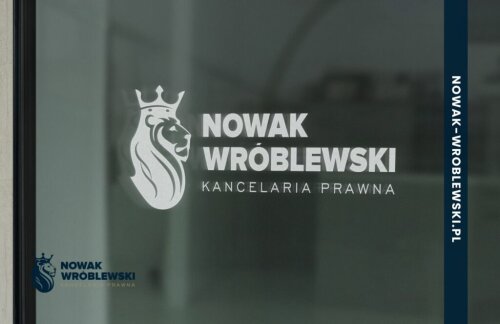Best Corporate & Commercial Lawyers in Tarnobrzeg
Share your needs with us, get contacted by law firms.
Free. Takes 2 min.
List of the best lawyers in Tarnobrzeg, Poland
1. About Corporate & Commercial Law in Tarnobrzeg, Poland
Corporate and commercial law in Tarnobrzeg operates within the wider Polish legal system. Local businesses follow national statutes for company formation, governance, contracts and disputes. Tarnobrzeg companies commonly use forms such as spółka z ograniczoną odpowiedzialnością (sp. z o.o.) and spółka akcyjna (S.A.).
In practice, corporate decisions, filing requirements and registration steps are governed by national acts, while local business needs may involve regional authorities and courts. This means a Tarnobrzeg business often engages a corporate lawyer for formation, governance structures and cross border dealings. A qualified attorney can help ensure compliance and reduce risk from day one.
Polish corporate law emphasizes clear governance, proper record keeping, and timely reporting. For businesses in Tarnobrzeg, standard topics include shareholder agreements, boards and supervisory boards, and accuracy in the National Court Register (KRS) filings. Understanding these fundamentals helps protect ownership, control and value over time.
2. Why You May Need a Lawyer
Here are concrete, real world scenarios in Tarnobrzeg where a corporate lawyer is typically needed.
- A local manufacturing firm in Tarnobrzeg plans to form a sp. z o.o. and attract investment from a Warsaw partner. A lawyer can organize share capital, draft the articles of association and prepare the necessary KRS filings.
- A Tarnobrzeg retailer signs a distribution agreement with a supplier and wants a contract that clarifies governing law, delivery terms and dispute resolution. A lawyer drafts and negotiates the contract to prevent future disputes.
- A Tarnobrzeg tech startup considers a merger with another regional company. A corporate attorney conducts due diligence, outlines integration steps and handles the merger agreement and any required regulatory notices.
- The local business faces a routine tax inspection or a regulatory audit. A lawyer prepares documentation, represents the company and negotiates with authorities to resolve issues without excessive penalties.
- Shareholder tensions arise inside a Tarnobrzeg company. A lawyer helps with governance matters, corrective actions, and potential buyouts under applicable corporate law to avoid protracted disputes.
- A Tarnobrzeg business wants to protect intellectual property or license IP to another entity. A corporate attorney drafts licensing agreements and ensures IP ownership remains clear.
3. Local Laws Overview
Two to three key statutes shape Corporate & Commercial law in Tarnobrzeg. These acts are national, but their application is felt across Tarnobrzeg businesses and local transactions.
- Kodeks spółek handlowych (KSH) - Commercial Companies Code governs formation, governance and dissolution of commercial companies such as sp. z o.o. and S.A. It provides rules on share capital, management, and corporate governance. Date of origin: 15 September 2000; remains in force with numerous amendments. For current text, see ISAP and official summaries.
- Kodeks cywilny (Civil Code) provides general rules for contracts, obligations and civil transactions that underpin most commercial arrangements. The Civil Code forms the baseline for contract drafting, remedies and duties between parties. It originated in 1964 and continues to be amended to fit modern commerce.
- Ustawa o ochronie konkurencji i konsumentów (Competition and Consumer Protection Act) regulates unfair business practices, restrictive agreements and consumer protection in commercial dealings. This act assists Tarnobrzeg businesses in competing lawfully and fairly. Original law date: 16 February 2007, with ongoing updates to reflect market changes.
Source: Official acts and summaries available on the Internetowy System Aktów Prawnych (ISAP). ISAP - Internetowy System Aktów Prawnych
4. Frequently Asked Questions
What is the difference between sp. z o.o. and S.A.?
A sp. z o.o. is a limited liability company with an easier setup and limited shareholder liability. An S.A. is a joint stock company suitable for larger scale ventures and easier public share transfer. Governance and capital requirements differ accordingly.
How do I register a company in Tarnobrzeg?
Registration typically involves preparing articles of association, appointing management and a supervisory board if needed, and filing with the National Court Register (KRS). You may also need to register for tax and social contributions with the appropriate authorities.
What is the typical cost to form a sp. z o.o. in Poland?
Costs include notary fees, court filing charges, and potential legal counsel fees. A typical range is 1 500 to 5 000 PLN depending on complexity and whether you use a full service package.
How long does it take to set up a company in Tarnobrzeg?
Formation can take between 2 and 6 weeks, depending on the completeness of documents and the speed of the relevant offices. Notary and KRS filings are the main time drivers.
Do I need a Polish tax number (NIP) for a foreign investor?
Yes. If you have business activities in Poland, you generally need a NIP for tax purposes. Your lawyer can guide you on registration steps with the tax office.
What is the difference between a contract and a memorandum of understanding?
A contract creates legal obligations between parties. A memorandum of understanding outlines intended actions but may not be legally binding unless stated otherwise in the document.
Can I sign legally binding contracts remotely in Poland?
Yes, provided the documents are properly executed (for example with electronic signatures where permitted and compliant with law). A lawyer can ensure the process meets legal requirements.
Should I hire a corporate lawyer for a merger?
Yes. A corporate lawyer can perform due diligence, draft and negotiate the merger agreement, and manage regulatory notices and filings to minimize risk.
Do I need a notary for certain corporate documents?
Some documents require notarization, such as certain share transfers or initial formation documents. Your lawyer can confirm which documents need notarial acts.
What is the KRS and why do I need it?
The National Court Register (KRS) records corporate data, ownership and legal status. Filing to KRS is necessary to establish and maintain corporate legitimacy in Poland.
How much does due diligence cost in a local Tarnobrzeg merger?
Due diligence costs vary by deal size and scope but typically range from 5 000 to 50 000 PLN for smaller deals, plus any additional advisory fees.
Is the Polish court system accessible for corporate disputes in Tarnobrzeg?
Yes. Corporate disputes may be heard in local courts with appeal options available to higher regional courts. A lawyer can guide you through timelines and procedures.
5. Additional Resources
- CEIDG - Central Registration and Information on Business. Maintains records for sole traders and entries related to business activity in Poland. Official functions include registration, updates and deregistration of business activity. ceidg.gov.pl
- ISAP - Internetowy System Aktów Prawnych. Official repository for Polish legal acts, including KSH, Civil Code and competition laws. isap.sejm.gov.pl
- PARP - Polska Agencja Rozwoju Przedsiębiorczości. Provides information on business support programs, training and financing for entrepreneurs. parp.gov.pl
6. Next Steps
- Define your business objective and decide the optimal corporate form for Tarnobrzeg - sp. z o.o. vs S.A. - based on capital, control and future plans. Timeline: 1 week.
- Identify a local corporate lawyer with Tarnobrzeg or Subcarpathian region experience who can review documents and explain local nuances. Timeline: 1-2 weeks.
- Gather key documents such as identification, proof of address, business plan, and any existing contracts for review. Timeline: 1-2 weeks.
- Request a detailed engagement proposal covering scope, milestones and fees. Timeline: 1 week after initial consultation.
- Prepare formation or transaction documents with your lawyer and file with KRS or CEIDG as required. Timeline: 2-6 weeks depending on filing and approvals.
- Review all contracts and due diligence materials with your attorney to identify risks and negotiate terms. Timeline: ongoing during the deal process.
- Finalize governance structures, register changes and establish ongoing compliance processes with your lawyer’s assistance. Timeline: ongoing post formation or post deal integration.
Lawzana helps you find the best lawyers and law firms in Tarnobrzeg through a curated and pre-screened list of qualified legal professionals. Our platform offers rankings and detailed profiles of attorneys and law firms, allowing you to compare based on practice areas, including Corporate & Commercial, experience, and client feedback.
Each profile includes a description of the firm's areas of practice, client reviews, team members and partners, year of establishment, spoken languages, office locations, contact information, social media presence, and any published articles or resources. Most firms on our platform speak English and are experienced in both local and international legal matters.
Get a quote from top-rated law firms in Tarnobrzeg, Poland — quickly, securely, and without unnecessary hassle.
Disclaimer:
The information provided on this page is for general informational purposes only and does not constitute legal advice. While we strive to ensure the accuracy and relevance of the content, legal information may change over time, and interpretations of the law can vary. You should always consult with a qualified legal professional for advice specific to your situation.
We disclaim all liability for actions taken or not taken based on the content of this page. If you believe any information is incorrect or outdated, please contact us, and we will review and update it where appropriate.
Browse corporate & commercial law firms by service in Tarnobrzeg, Poland
Tarnobrzeg, Poland Attorneys in related practice areas.










